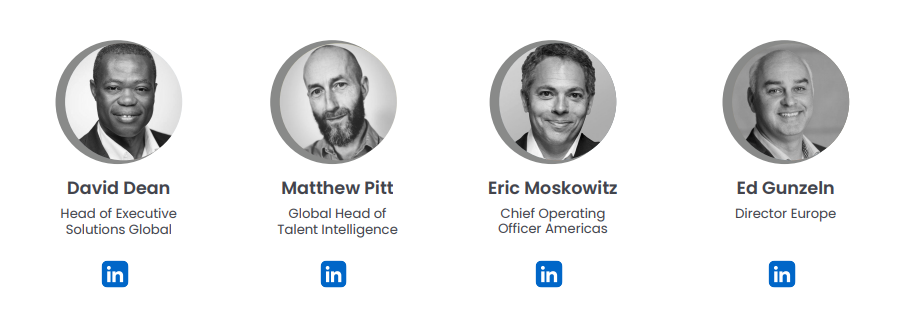A quarterly digest of facts, figures and opinion from the Talent Aquisition sector
January 2025

Is DEI dead?
Companies are losing faith in the diversity project
One of our recent projects involved speaking to a number of DEI leaders across the US and Europe. Our interviewees came from a wide range of sectors, but they spoke nevertheless in the same rather downbeat tone of voice.
If we’d run the same project a couple of years ago, chances are we’d have come away with the impression of a confident, high-energy bunch of business leaders. Post BLM and MeToo, there was palpable, worldwide confidence that we could create a more caring and inclusive world.
In short, DEI was cool. But fast forward to today and the vibe has shifted.
There are some obvious reasons for this. The incoming Trump administration is well known for its disparagement of DEI. The US legal landscape has also shifted following the April 2023 Supreme Court ruling which outlawed positive discrimination at universities. This seems to have prompted a number of companies, including McDonald’s, Harley Davidson and Jack Daniel’s, to abandon their diversity targets.
But maybe there’s a deeper reason DEI leaders seem a bit gloomy. Could it be that they’ve lost faith in the project? No moral person could disagree that we need to create supportive, inclusive workplaces. But key to that objective is ensuring different groups regard each other with mutual trust. And recent developments suggest that’s not happening. Men are nowadays commonly
described as ‘toxic’. White people are encouraged to feel ‘guilt’. Successful minorities are often accused of being ‘diversity hires’.
Then of course there are the conflicting interests of disparate groups. The LGBT agenda is arguably at odds with Islam. Promoting transgender rights runs up against the rights of women to safe spaces. Regardless of what you think about any of these debates, it’s impossible to pretend they don’t exist.
Recent legal and political events will ensure that DEI leaders are circumspect in what programs and initiatives they devise. But the smarter ones will also be careful about the messaging around these, mindful that they need to keep all employees and consumers onside.
If they don’t, the whole DEI enterprise could come to a shuddering halt.
The World According to WhiteCrow

As one of the world’s largest sourcing and recruitment company, WhiteCrow works with clients across multiple geographies and sectors. So a brief glance at what we’re working on ought to provide a clue to what’s going on in the wider market.
Over the last quarter, the data tells us this:
- Projects were down in the last couple of months of 2024, but that’s no great surprise. December of course is always a little quieter. True, you sometimes get a rush of clients looking to spend budget before it disappears on New Year’s Day (and we saw a bit of that) but the looming Christmas break more often has the effect of slowing or delaying decisions.
- What’s more interesting is the steadily rising percentage of projects which are research related. That means even if companies aren’t hiring today, they certainly intend to do so tomorrow. That ought to bode well for recruitment activity in Q1, but let’s see …
- On a related note, our Executive Search and Talent Intelligence arms have recently been very busy. Again, that suggests companies are taking a more strategic approach to hiring, but are also happy to make the investment that sort of undertaking requires. We are seeing a lot of Location Analysis studies (Malaysia keeps cropping up) and an increasing number of Succession Planning projects.
- These clients have worked out that Talent Intelligence is empowering. It allows you to engage with colleagues from a position of knowledge and come up with solutions that actually work in the real world.
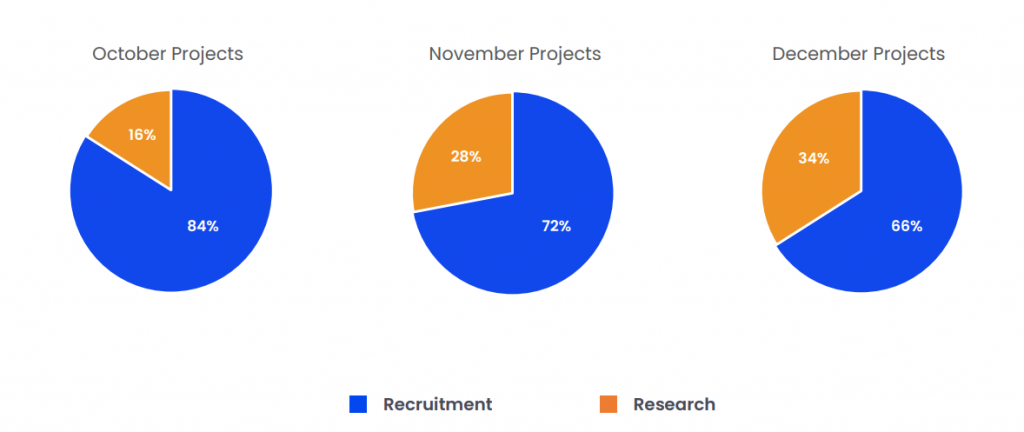
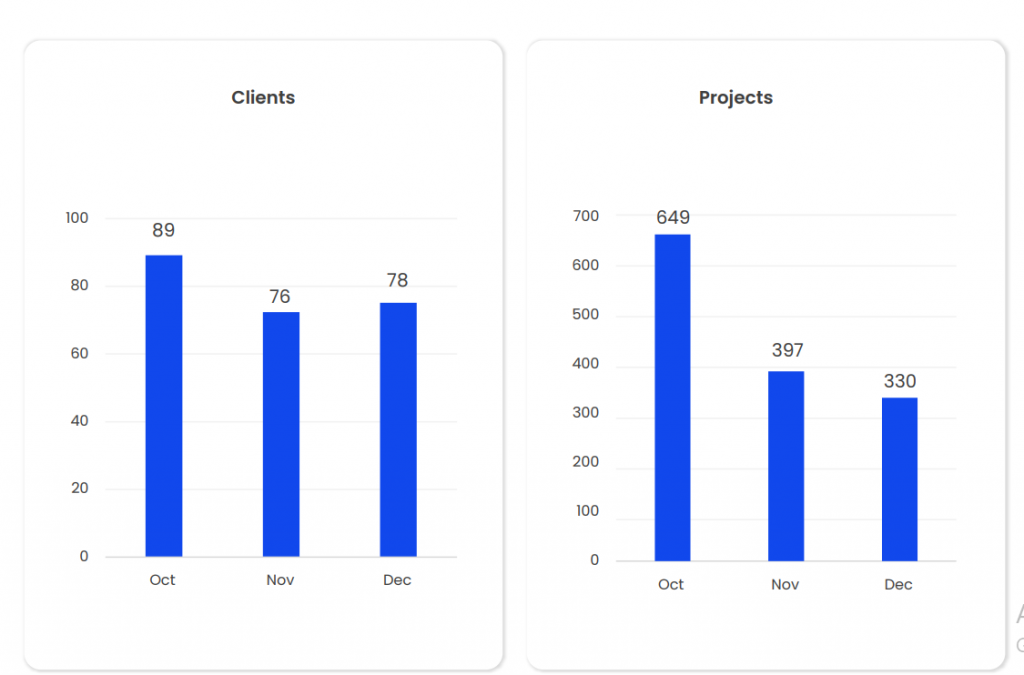
Talentomics
Whatever your view on the big issues of the day, we can all agree these are unpredictable times. That’s a nightmare for workforce planning. So now more than ever Talent teams need to be across the numbers. Below, we share a selection of economic charts and comment briefly on their implications for recruitment.
1. The importance of being idle
Average Annual Hours Worked per Person
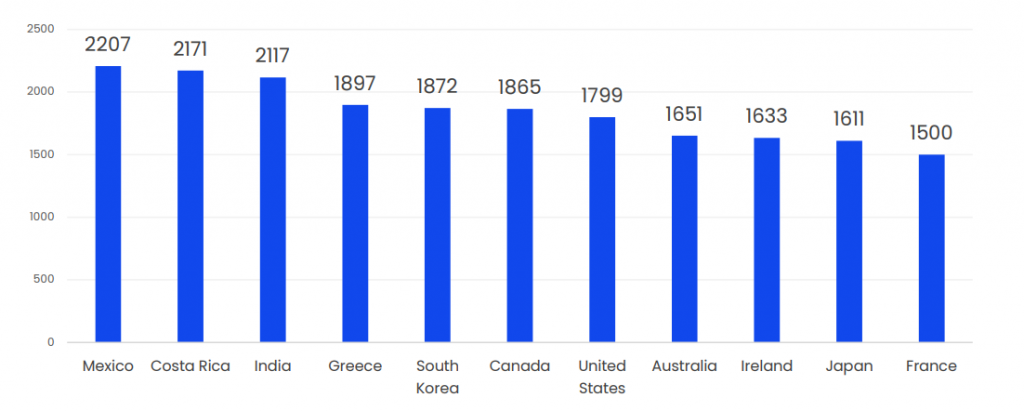
- During the recent row in the US over H1B visas, Vivek Ramaswamy suggested that Americans have become lazy and mediocre in comparison to their harder-working Indian counterparts.
- That prompted us to look at the average annual hours worked per person across different countries. Based on these data, Ramaswamy might have a point: Indians do indeed put in a slightly longer shift than Americans. But the difference is not big and, in any case, the overall data set drives a slightly different narrative.
- The fact is, there does not seem to be much of a correlation between economic growth and hours worked. It sort of makes sense that South Korea is among the hardest working nations, but Mexico and Costa Rica? Great countries, both, but hardly economic powerhouses.
- It could be that simply putting in the hours is only half the challenge. For a country to be really successful, it also needs creativity and innovation. As Vivek himself would surely agree, nothing successful happens unless someone has the time to stop and think.
2. On-site insight
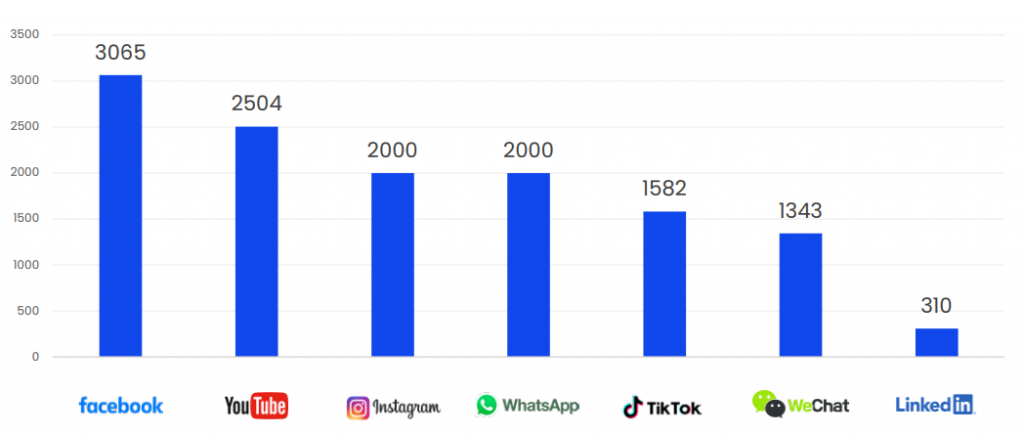
- When was the last time you walked into an employment agency? Or applied for a job you saw advertised in a newspaper? Nowadays, most candidates do all their job hunting online and that usually means one place: LinkedIn.
- But that doesn’t mean TA professionals need to operate in the same way. Yes, the world’s top professional networking site is a great place to identify talent pools, approach candidates and download talent analytics. But it’s not the only show in town.
- As our graph shows, its monthly active users (MAUs) are just a fraction of those that other sites can boast about. That means any candidate you find on LinkedIn will probably be active on at least one other platform. Track them down and you can get a lot of information on who they are, what motivates them and how best to approach them.
- The same is true of companies, all of which now maintain a presence on all sorts of platforms. Sure, a lot of their content will be irrelevant to your purposes as a recruiter, but not all of it. If you’re just doing your job on LinkedIn, you’re missing out on a whole universe of insight.
3. Finally . . . proof that everyone reads the Whisper

- What do the six words above have in common? Answer: they’re difficult to spell, apparently. A recent study by QR Code Generator listed them among the most mis-spelled words on CVs.
- That raises the question of exactly how they were misspelled. Okay, those double ‘r’s in ‘referred’ and ‘preferred’ could conceivably trip someone up, but then again, it’s not 1948. Have these bad spellers not heard of spellcheck or Chat GPT?
- AI would also avoid any usage of the top 10 overused words as highlighted by the same study. Among these are ‘skilled’, ‘trained’, ‘motivated’ and ‘responsible’. Quite surprised not to see ‘passionate’ on there, but maybe people have been deleting that word from their resumes after our Wordplay section last quarter. You see what reach we have?
Quote of the Quarter

This remark was made by one of our recent candidates when asked why they’re looking for a new job. Not a particularly memorable quote, you might think. Who hasn’t frequently said or thought something similar about their own job? Or indeed their hairdo or wallpaper. But what made this particular comment stand out was its timing. The person had only been with their employer for 18 months.
It goes to show that short employment tenures are now the norm. With the demise of defined benefit pensions and the strengthening of employee rights, it was inevitable that professionals would be less inclined to stick with the same employer for years on end. But the post-COVID craze for working from home has undoubtedly loosened the bonds of loyalty further. Why commit to a companywhen you seldom go into the office and would barely recognize most of your colleagues if you passed them in the street?
Instead, many workers now see themselves as self-employed. In their heads, they’re freelancers and each new job is really just a short- or medium-term project. Ask any contractor, and they’ll tell you that 18 months is actually quite a long project. In fact, it’s about the time when you might reasonably start thinking to yourself, ‘it’s time for a change’.

Wordplay
Like any industry, recruitment has its lexicon of odd words and phrases. The best of these serve to illuminate complex topics; the worst merely confuse and obfuscate.
As for the rest, well, let’s take a closer look . . .

Last week, an estate agent told me that property prices in my neighbourhood had increased by 10% in the last year. Then he paused and said “if that makes sense”.
The phrase stayed with me for a couple of reasons. Firstly, it was the seventh or eighth time he used it in the last few minutes. Secondly, what he’d told me about house prices was such a straightforward, clearly articulated proposition, I couldn’t imagine how any intelligent English speaker could decide it didn’t make sense.
If the fellow had been expounding a theorem from Euclid or speaking in an impossible Hungarian accent, I suppose it might have been reasonable to check I’d understood. But otherwise, it just sounded like an annoying verbal tic.
Unfortunately, it’s one you hear a lot these days. In meeting after meeting, people ask whether perfectly cogent, well worded statements “make sense”. It’s tempting to conclude it’s just the modern day version of saying “do you know what I mean?”. But I rather suspect some people think it makes them sound clever. If I behave (they reason to themselves) as though I’ve just said something rather complex and challenging, then perhaps I really have.
That’s my theory anyway. Does that make sense?
Contact
To discuss any of the issues raised in this month’s newsletter or to explore how WhiteCrow Research can help with any of your talent insight and recruitment needs, please contact us.

